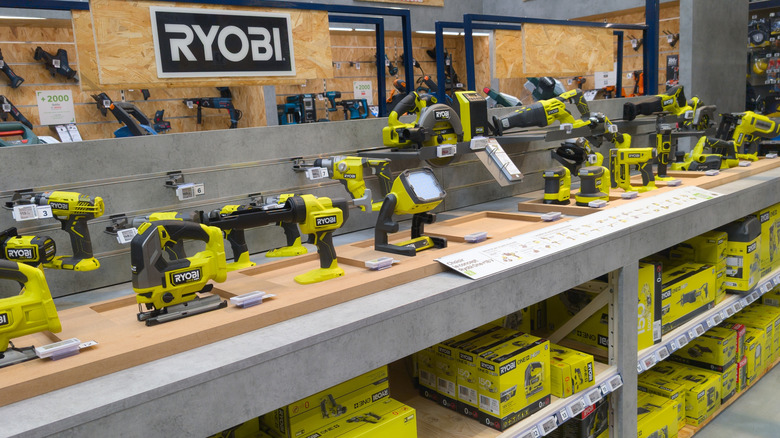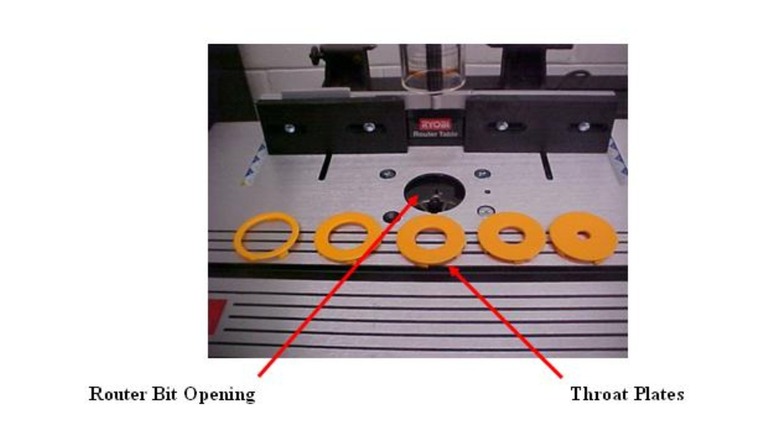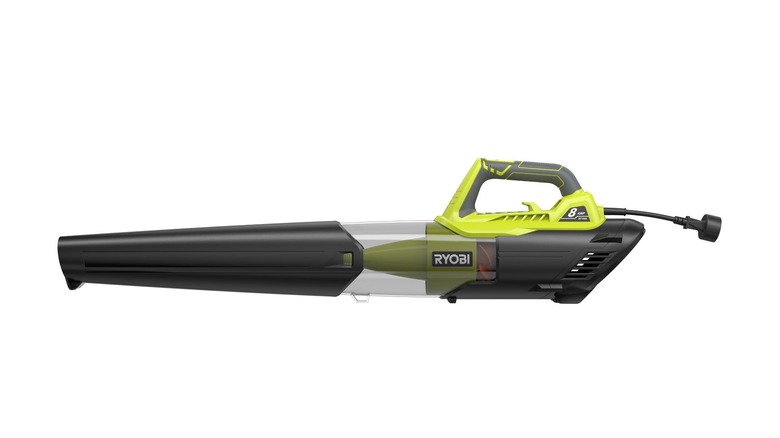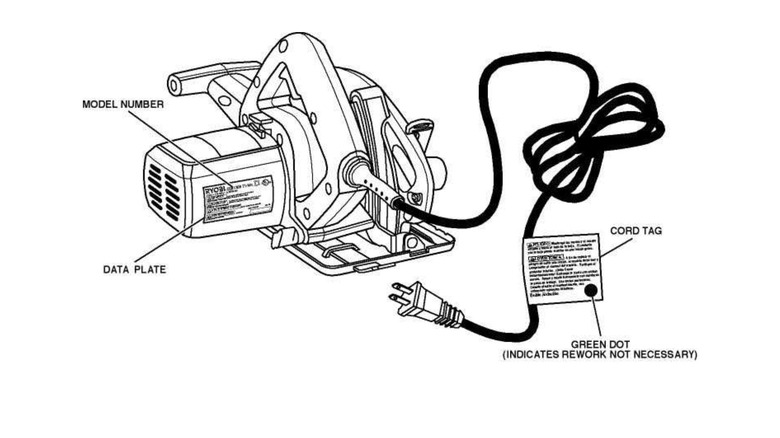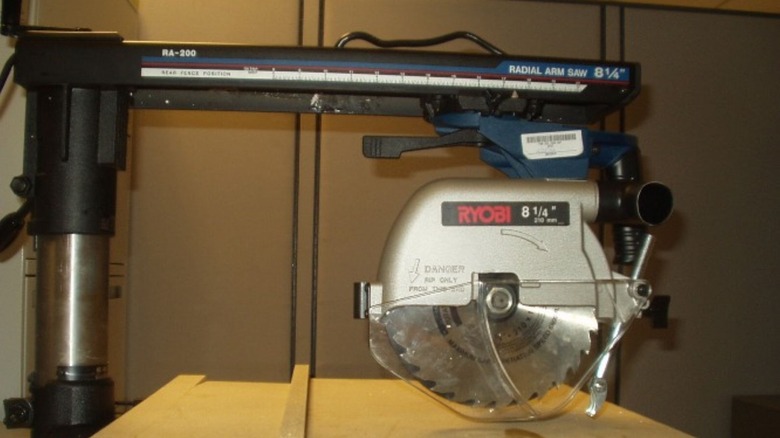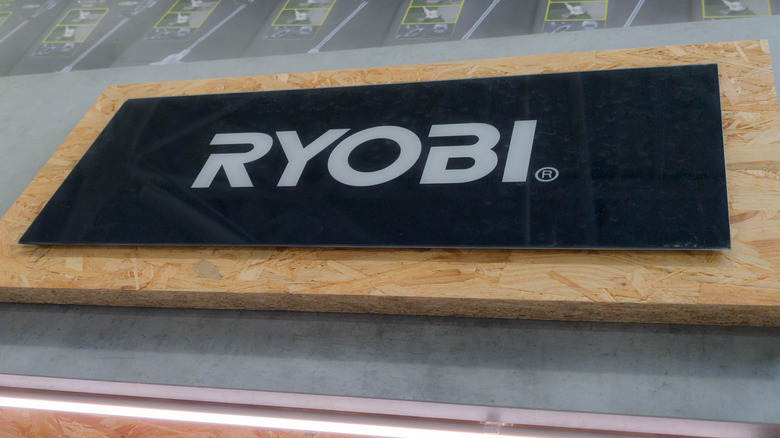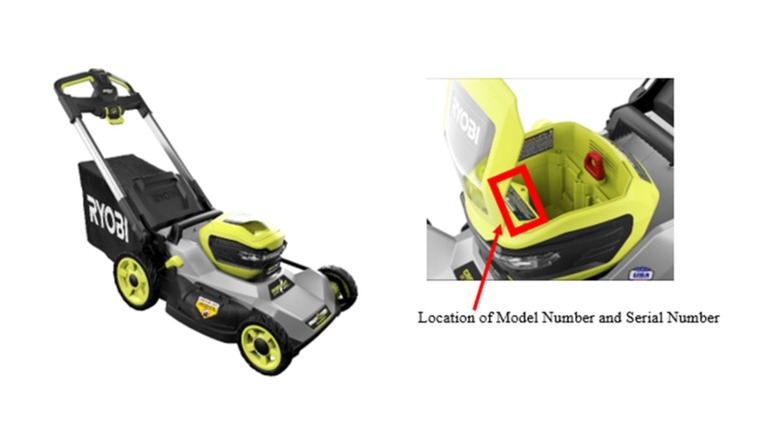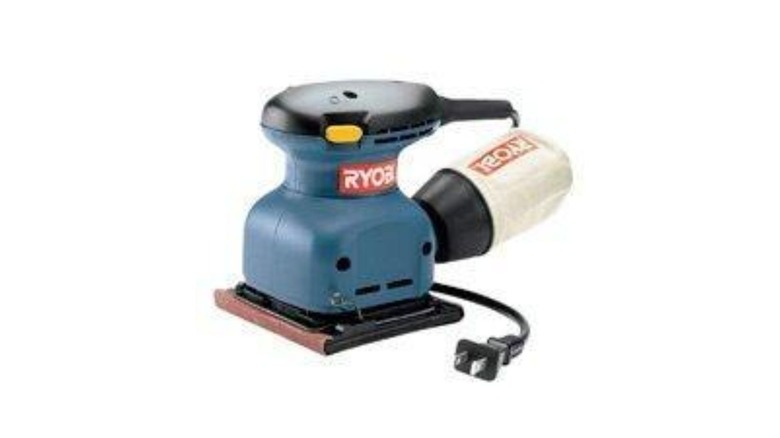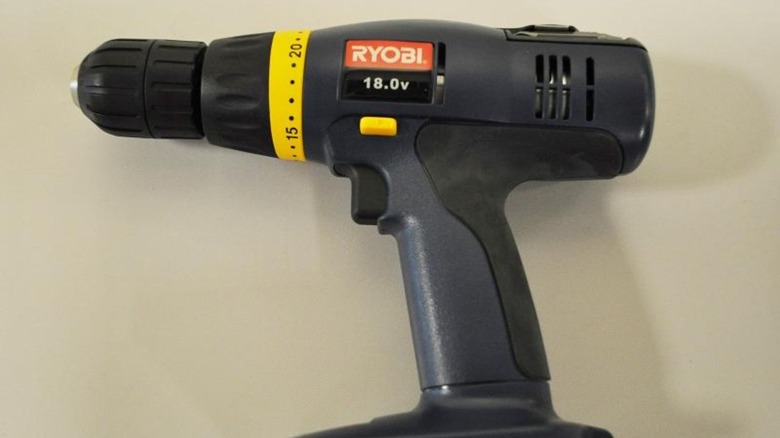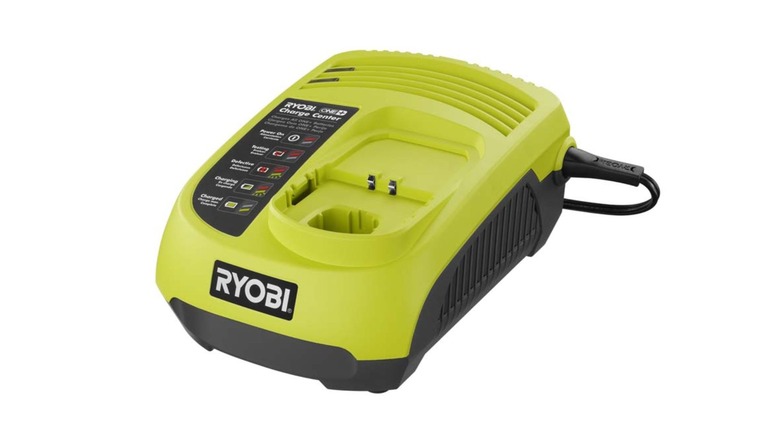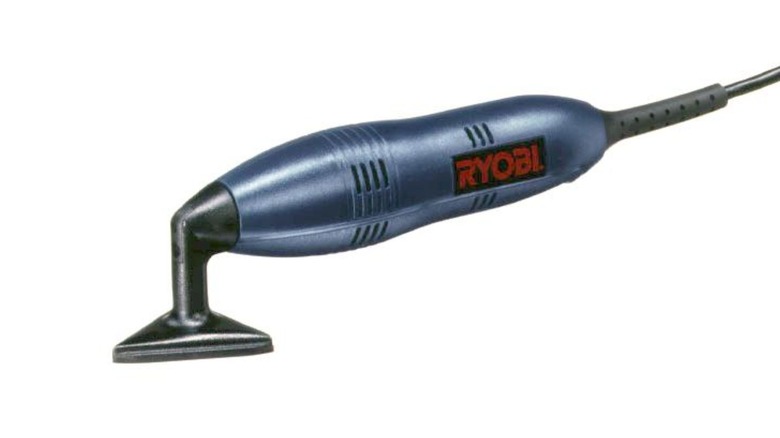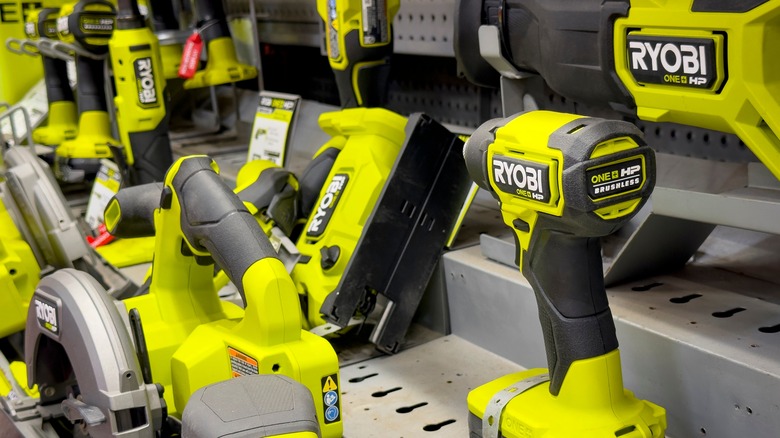10 Of The Biggest Ryobi Recalls In Recent History
When it comes to investing in new power tools, hand tools, or equipment, Ryobi is one of the best brands to consider for your next DIY project. It makes a vast array of products, including but certainly not limited to electric blowers, corded and cordless drills, mowers, table saws, and tool kits for beginners and experienced DIYers. However, just because a brand has a reputation for delivering great products most of the time, that doesn't mean it's immune to problems.
While many of Ryobi products have gone on to become fan-favorites, a few have hit the shelves before they should, and ended up involved in some of the biggest recalls in recent history. Among other things you should consider before buying Ryobi tools, the brand's recall history is important to check out prior to your purchase, especially if you're considering investing in used tools or equipment through a local marketplace.
We've gathered up 10 of the biggest Ryobi recalls in U.S. history, based on the number of units involved in the recall. Read on to see if you've ever encountered one of these recalled products.
Ryobi router table throat plates — 100,000 units
Any recall involving blades is always a bit scary, but luckily, this recall didn't have many related injuries. In March 2007, One World Technologies recalled about 100,000 Ryobi router table throat plates because they didn't "securely snap into the router table's top bit opening."
Because they didn't fit properly in place, they could potentially detach and be ejected towards the operator during use. Only three reports of the throat plates coming loose were reported, two of which involved the user being "stuck on the nose by the throat plate and [receiving] a minor cut and bruising."
These router table throat plates were sold exclusively at Home Depot stores across the U.S. between May 2004 and January 2007 for around $100 as part of a kit with the router, router table, and throat plates. Consumers who purchased one of these router tables with recalled throat plates were instructed to stop using them as soon as possible and to reach out to One World Technologies to receive a free replacement set of throat plates that would properly snap into place.
Ryobi 8-amp electric jet fan blower — 121,000 units
In March 2017, roughly 121,000 Ryobi electric jet fan blowers were recalled in the U.S., along with about 1,900 units in Canada and 1,100 units in Mexico. The blowers were recalled because the plastic fan inside could break and subsequently cause the broken fan pieces "to be discharged from either end of the blower tube."
This recall has the most customer-reported incidents of any Ryobi recall within the past few decades. According to the Consumer Product Safety Commission (CPSC), One World Technologies received 10,681 incident reports in total, with 25 reports detailing "minor injuries, such as lacerations to the face, hands and legs from fan blade pieces."
There was no repair available for this electric blower, only a replacement. Consumers who purchased one of these recalled blowers were told to stop using it right away and to get in contact with One World Technologies to receive a replacement at no cost to them.
This Ryobi electric blower model was sold exclusively at Home Depot stores in the U.S. and via the store's online website in Canada and Mexico between December 2015 and December 2016 for around $40.
Ryobi 7¼-inch circular saws — 125,000 units
In September 2001, approximately 125,000 7¼-inch circular saws were recalled because the guard on the lower blade could "stick in the open position" and potentially injure either the operator or bystanders.
Luckily, Ryobi never received any reports of injuries from this circular saw, but still recalled them to prevent any future injuries. Circular saws certainly aren't a Ryobi tool for beginners, which could be the reason why no injuries were ever reported. More advanced users would likely notice the issue immediately and proceed with caution or stop using the circular saw.
This recall affected five different Ryobi circular saw models, which originally sold for $60 to $140 at various hardware stores and home centers throughout the U.S. between October 1998 and July 2001. It was recommended to consumers to stop using the recalled circular saw models right away and to reach out to Ryobi's customer service team to receive a free repair kit to fix the issue.
Ryobi radial arm saws — 145,000 units
In this terrifying July 2006 recall, about 145,000 Ryobi radial arm saws were affected due to the blade assembly potentially detaching and falling while in use because the plastic motor housing surrounding it could crack.
Among the 145,000 recalled saws, there were thankfully only five total reports received by Ryobi, though four reports detailed "lacerated fingers" as a result of the blade detaching unexpectedly. Consumers were told to stop using these radial arm saws right away and to reach out to Ryobi customer service to "return part of the saw for a payment of $75."
The saws were originally sold for $200 to $300 at various home and hardware stores throughout the country between 1986 and 1997. It's specifically noted that no repair was available for this recalled product, so it's unclear if consumers were able to continue using the saw without the affected piece or if they were sent a replacement piece.
There are plenty of top-rated Ryobi tools available today, but radial arm saws don't make the list, especially not this particular recalled model.
Ryobi 10-inch table saws — 150,000 units
In March 1996, Ryobi recalled roughly 150,000 10-inch table saws because the power switch lock-off mechanism was malfunctioning. Put simply, the table saw had a switch lock-off key that needed to be near the "On" button in order to properly turn on, but Ryobi learned of some cases in which the saw turned on without the lock-off key when the "Off" button wasn't fully depressed in the prior session.
If the saw accidentally turned on without this switch lock-off key, "children and others who should not have access to the saw could be injured by the moving blade." Luckily, Ryobi didn't receive any reports of injuries due to this flaw, but understandably pulled the table saws to repair them regardless.
This recall affected Ryobi BT3000 table saws sold starting in May 1991 at various hardware stores across the U.S., as well as a Craftsman Model 315.22185 table saw sold at Sears starting in July 1994. Both table saws originally retailed for between $400 and $600, and if you purchased one of these table saw models, you could reach out to a customer service number to have replacement switches installed free of charge.
Ryobi 40-volt walk-behind mowers — 217,500 units
One of Ryobi's most recent recalls involves multiple 40-volt walk-behind lawn mower models. These lawn mowers were recalled in February 2025 because "a push-on connector inside the powerhead" could overheat and possibly start fires.
Among the estimated 217,500 recalled units sold in the U.S. and roughly 28,400 units sold in Canada, only 97 reports of overheating were received, according to the CPSC. Five of these reports specifically noted fires, and two detailed "minor burn injuries."
Consumers with a recalled lawn mower model were instructed to stop using the mower at once and to contact TTI Outdoor Power Equipment to receive instructions on how to disable the mower and collect a replacement walk-behind mower free of charge.
These walk-behind lawn mowers were sold at Home Depot and Direct Tools Factory Outlet stores between February 2021 and January 2025 for $500 to $700, depending on which of the 10 affected models was purchased.
Ryobi ¼-sheet sanders — 300,000 units
Roughly 300,000 Ryobi ¼-sheet sanders were recalled in May 2011 because fan pieces could break off from the assembly and potentially "be ejected from the product, posing a laceration hazard to consumers." Per the CPSC, 31 reports detailing fan pieces flying out from the Ryobi sander model S651D were received, two of which noted "minor lacerations" from the fan pieces.
The recalled S651D sanders were originally sold at Home Depot, Amazon, and a few other retailers for about $30 between June 2005 and August 2010, leaving roughly a year gap between the last sander sold and the official recall date.
According to the CPSC, this sander was colored blue and black and the model number was printed on the data plate below the handle. For those that had one of these ¼-sheet sanders, the instructions were to stop using it immediately and reach out to One World Technologies to get a replacement sander for free.
Ryobi Model HP 1802M cordless power drills — 455,000 units
Ryobi ranks pretty highly among every major cordless drill brand available, but unfortunately, that doesn't mean every drill the company makes is without issue. The Model HP 1802 cordless power drill from Ryobi had approximately 455,000 units recalled in October 2010, making it one of the biggest power tool recalls in U.S. history.
These cordless drills were recalled because the switch could overheat, "posing a fire and burn hazard to consumers." In total, Ryobi collected 47 reports of this cordless drill model overheating, with some reports mentioning "smoking" or "melting." 12 of these reports noted property damage to their home or vehicle, and two suffered "minor burns" from touching the drill's switch when it was too hot.
According to the CPSC, the Model HP 1802M drill was sold at Home Depot for around $100 between January 2001 and July 2003, despite the recall not being issued until nearly seven years after the drill's last sold date. For consumers with one of the recalled drills, the instructions were to stop using the drill at once, take out the rechargeable battery, and contact Ryobi to get a replacement cordless drill free of charge.
Ryobi P113 dual chemistry battery chargers — 578,000 units
Old battery chargers can come with a plethora of problems, so they're definitely Ryobi products you shouldn't buy secondhand. And you'll especially want to steer clear of Ryobi's P113 dual chemistry battery charger, which had about 578,000 units recalled in the U.S. in November 2013, and then an additional 49,000 units recalled in Canada.
These dual chemistry battery chargers, which were designed to be used with both Li-Ion and NiCd power tool batteries, were recalled for the vague reason that they could "malfunction, posing fire and burn hazards to consumers." Although the recall wasn't issued until November 2013, the charger was sold at hardware stores from September 2007 to December 2009 for $30 to $270, depending on whether it was sold individually or as part of a kit.
At the time of the recall, 25 reports of the P113 charger overheating had been sent in, with details on property damage to the charger itself and the surrounding area. Per the CPSC, consumers were instructed to remove any battery currently on the charger right away and to contact One World Technologies to receive a replacement charger at no cost.
Ryobi detail sanders — 1.2 million units
In March 1998, roughly 1.2 million Ryobi detail sanders were recalled because "pressure from the switch's rubber dust boot" was strong enough to force the switch "on" if it wasn't fully pushed into the "off" position. If the sander continued to run without the user knowing, it would start to build up heat and potentially cause a fire.
According to the CPSC, Ryobi received three reports of the sanders "possibly causing fires," one of which apparently led to "substantial property damage." Luckily, among these three incidents, no injuries were reported to Ryobi.
This recall involved Ryobi's DS 1000 sander model, along with two Craftsman sander models: 315.11639 and 315.11600. Units built between May 1993 and April 1997, and then sold between May 1993 and March 1998, were the ones recalled.
Consumers with one of these affected detail sanders were told to unplug it when not using it to ensure it wouldn't accidentally turn on and generate heat. Then, they could contact Ryobi to discuss getting their sander either repaired or replaced free of charge.
Methodology
To locate the biggest Ryobi recalls in U.S. history, the Consumer Product Safety Commission (CPSC) was our main resource. We took the time to manually sift through all of Ryobi's available recall documentation on the website.
Then, to compile this list, we strictly looked at the number of units involved in each recall, picked the 10 incidents with the highest number of units recalled, and ordered them from the least units involved to the most units involved.
When ranked among every major power tool brand, Ryobi earns a spot in the middle of the pack, albeit slightly closer to the best brands than the worst brands. Like almost every brand, Ryobi has multiple reliable products and a few duds, recalled or not. No power tool brand is immune to a future recall, so the best piece of advice to take away from this is to register your power tools as soon as possible, whether you buy from Ryobi or a different brand.
